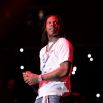No one was a better narrator or public speaker during the 20th Century than Martin Luther King Jr., and no speech was better than his landmark "I Have A Dream" speech, the work that best sums up the goals and ideals of the Civil Rights leader. Understandably, the hip-hop community and the rest of popular music respects the accomplishments of Dr. King and the impact he's had on the world, in entertainment and otherwise. Check out these six tracks that pay tribute to King as we celebrate martin Luther King Day at Music Times.
"American Dream" by Bobby Womack (1984)
Bobby Womack was pretty close to ground zero when King made his earthshaking "I Have A Dream" speech at the National Mall. He was 19 year-old when the speech was made, the prime of his formative years. It would be five years before the R&B icon released his first album and another 16 years before he would release The Poet II, which would end with the triumphant "American Dream," a reference to the dream cited during King's speech, accompanied by an audio clip of the same quotation. That album would also feature opening track "Love Has Finally Come At Last," which, while not naming King specifically, certainly rings with the epic "free at last!" declarations made by the Civil Right's icon.
"Increase The Peace (What's Going On)" by Three Times Dope (1988)
Few cities are as under-appreciated for its hip-hop history as Philadelphia, and Three Times Dope is certainly a noteworthy contribution to that scene. Dr. King was certainly the most influential figure in the fight against white oppression, but he was also heavily involved in making sure that the black community remained healthy within itself, both as a man of religion and otherwise. He won the Nobel Peace Prize for his emphasis on nonviolent resistance during his activism and many acts bought into his beliefs, preaching that issues within the community should be handled nonviolently for the betterment of life as a whole.
"The King" by Grandmaster Flash and The Furious Five (1988)
Grandmaster Flash and The Furious Five made hip-hop history with its 1982 classic "The Message," which set the ground level for conscious hip-hop like perhaps no other song in history. Although this track will never replace "The Message," Flash and Co. came back during the collective's 1988 comeback album On The Strength. "The King" paid tribute to the greatest name in conscious discussion, regardless of skin color, by citing "I Have A Dream" during the track, an ode to the Civil Rights leader.
"Love's Gonna Get'cha (Material Love)" by Boogie Down Productions (1990)
Although Dr. King has been accepted by the world at large as the single greatest name in the Civil Rights movement, many in the black community preferred the influence of Malcom X and his more aggressive approach to the subject matter. This attitude made him the go-to figure for acts such as Public Enemy (although they too took the side of King during tracks such as "By The Time I Get To Arizona"). KRS-One aka Boogie Down Productions, had cited Malcom X heavily on previous albums, including the title of his classic By All Means Necessary. However he went with a clip from one of King's other famous speeches, "I've Been Up To The Mountaintop" during his track "Love's Gonna Get'cha (Material Love)."
"Long Way to Go" by Gwen Stefani feat. Andre 3000 (2004)
There was plenty of shenanigans going on during Gwen Stefani's solo Love. Angel. Music. Baby. (note "Hollaback Girl" among many), however she took a break from colorful music videos to make a statement on racial relations. "Long Way To Go" ends the album on a serious note, featuring Andre 3000 in a modern parable on interracial dating and how the public still reacts to it, more than 50 years after King's "I Have A Dream" speech. The song uses a less clear sample than the other tracks, but interpolates his words into the electronic breakdown at the end of the song.
"A Dream" by Common and Will.i.am (2006)
Few performers have been as active in incorporating Dr. King into their work than Common. The title track from his 2011 album The Dreamer/The Believer uses the "I Have A Dream" speech and this year he and John Legend have been nominated for numerous awards for their work on the song "Glory" from the film Selma. His work with King's work began thanks to The Black Eyed Peas' Will.i.am however, as part of their track "A Dream" from the 2006 film Freedom Writers. Common told The Washington Post that his collaborator's liberal use of King quips made him nervous: "So this was serious, you know? Now I'm collaborating with Dr. King...ain't no playing around now. Not only do I have to be good, I can't let down Martin Luther King."
© 2026 MusicTimes.com All rights reserved. Do not reproduce without permission.

![Tekashi 6ix9ine Targets Lil Durk's GF India Royale Online After Second Home Invasion [FULL STORY]](https://d.musictimes.com/en/full/95883/tekashi-6ix9ine-targets-lil-durks-gf-india-royale-online-after-second-home-invasion-full-story.jpg?w=103&h=103&f=21f3122f04fea6482ca51991c3c6c969)

